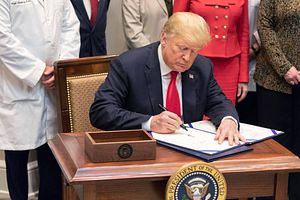On the final day of 2018, U.S. President Donald J. Trump signed into law the Asia Reassurance Initiative Act (ARIA), which passed the U.S. Senate earlier that month.
The act “establishes a multifaceted U.S. strategy to increase U.S. security, economic interests, and values in the Indo-Pacific region,” according to the White House.
Specifically, the ARIA will authorize $1.5 billion in spending for a range of U.S. programs in East and Southeast Asia and “develop a long-term strategic vision and a comprehensive, multifaceted, and principled United States policy for the Indo-Pacific region, and for other purposes.”
The ARIA includes multiple provisions and largely supports the Trump administration’s own National Security Strategy and National Defense Strategy documents, both of which have identified the Indo-Pacific as a strategic region of particular priority.
One day after the passage of the act, Chinese President Xi Jinping reiterated China’s longstanding position on Taiwan, a particular focus of the ARIA. Xi’s statements also followed Taiwanese President Tsai Ing-wen’s own New Year’s speech announcing a set of four principles for the country.
ARIA draws attention to U.S. relations with China, India, the ten member states of the Association of Southeast Asian Nations (ASEAN), and Northeast Asian allies Japan and South Korea.
Additionally, the act addresses U.S. policy toward North Korea. Specifically, ARIA calls on the U.S. Secretary of State, in conjunction with the Secretary of the Treasury, to justify the termination of U.S. support for any United Nations Security Council resolutions sanctioning North Korea or the lifting of any unilateral U.S. sanctions on North Korea.
North Korea has made clear that it seeks sanctions relief from the United States for the limited disarmament gestures it offered in 2018, including the closure of its one known nuclear testing site and the partial dismantlement of a test stand for missile engines associated with its intercontinental-range ballistic missiles capable of striking the United States.
The ARIA devotes considerable energy to reasserting U.S. support for Taiwan and calls on the president of the United States to “encourage the travel of high level United States officials to Taiwan, in accordance with the Taiwan Travel Act,” which was made law in 2018.
Elsewhere, ARIA devotes attention to the maritime commons in the Asia and the South China Sea, where it calls on the United States to support the ASEAN nations as they adopt a code of conduct in the South China Sea with China.
The law calls for the president to “develop a diplomatic strategy that includes working with United States allies and partners to conduct joint maritime training and freedom of navigation operations in the Indo-Pacific region, including the East China Sea and the South China Sea, in support of a rules-based international system benefiting all countries.”
































